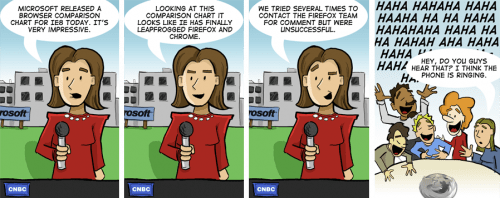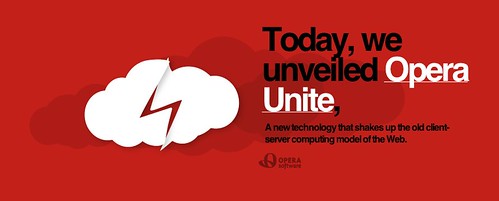All the new browser updates seem to be coming out at the same time, which definitely keeps the competition interesting. But while you continue to scoff at IE, gush over Firefox, and smile nervously at Opera, Chrome, and Safari, have you heard that ordinary computer users don’t actually know what a web browser is? Let’s get to that in a bit…
Internet Explorer is the “best”
I think people around the world made a collective ROFLMAO when the infamous IE8 browser comparison chart came out. I reserved any biased judgment when I first saw it, but oh my, Microsoft sure knows how to put its best features forward.
That’s not all it’s doing to promote the latest version of Internet Exploder, though. There’s a treasure hunt for $10,000 buried “online” (you have to use IE8 to find it, of course), and a donation of meals to charity (per IE8 download, of course).
Firefox has a new icon

New Firefox logo
Firefox is definitely the darling of the browser lot, so even a branding update—the fire, the fox, and the glossy globe are still intact and recognizable—is under magnified scrutiny.
Of course that’s not all there is to the next major release of Firefox, but I’m just glad they also care about their image. Lots of open source products pay little attention to the designery stuff. Firefox knows how to stay fresh and accessible to its audience without trying too hard (cough, see previous browser, cough).
Opera unites
Opera continues to innovate with its upcoming release, including an interface refresh from the same person who brought the Firefox logo to life. But it doesn’t stop there. Opera Unite cuts off the middleman for sharing photos, music, and all other kinds of files by turning the browser into a web server.
It’s not for everybody, but it’s a fascinating idea. An interesting twist to the “web as platform” concept. First there was web-based equivalents of desktop apps, as well as full-blown desktop interfaces on the web, then it was cloud computing, then it was the real-time web, then we have this. The jury’s still out on whether this will actually take off—considering Opera’s level of influence compared to the fox and the blue “e”—but any venture into Web 3.0 is a welcome effort. Here’s hoping we jump into it very soon.
But what is a web browser?
But apparently we can’t jump just yet. According to this discovery by The Next Web, the average internet user can’t tell the difference between a search engine and a browser, about 92% of those interviewed. Ironically, it was Google conducting the survey, and the final question was whether people knew that it had its own web browser.
Although Internet Explorer and Firefox were mentioned, people still didn’t know where the Web ended and the software began. It’s all just a blur of computer terms, which, at the end of the day, help them “find stuff”.
Knowing this, shouldn’t web browsers be scrambling to teach its users how the Internet works, including typing URLs into the address bar, and not just relying solely on search engines? Or should they just give up on the nth incarnation of the Browser Wars?
Originally posted on June 24, 2009 @ 3:04 am

